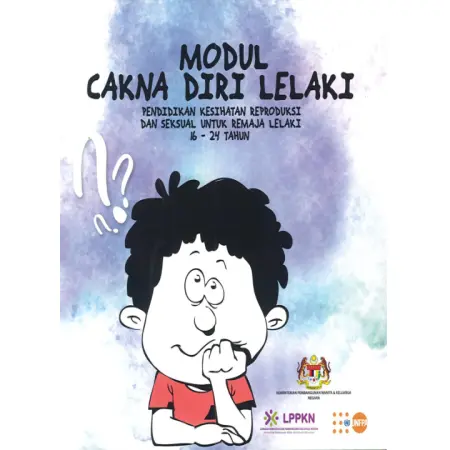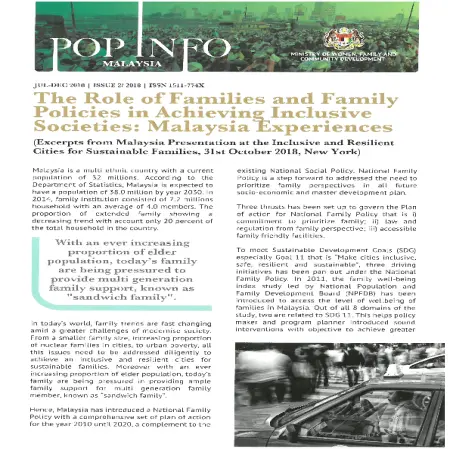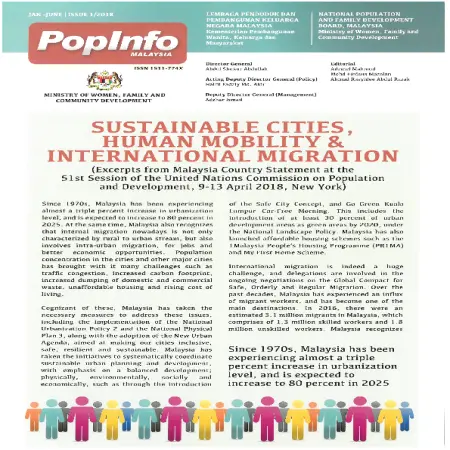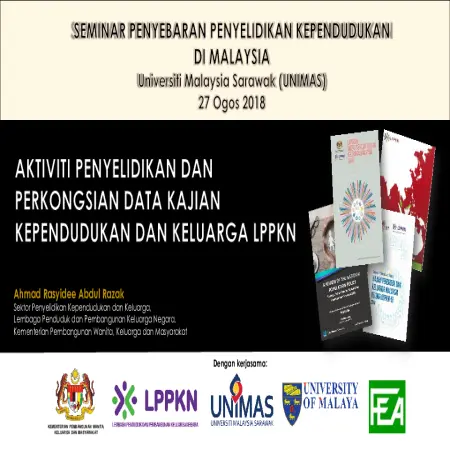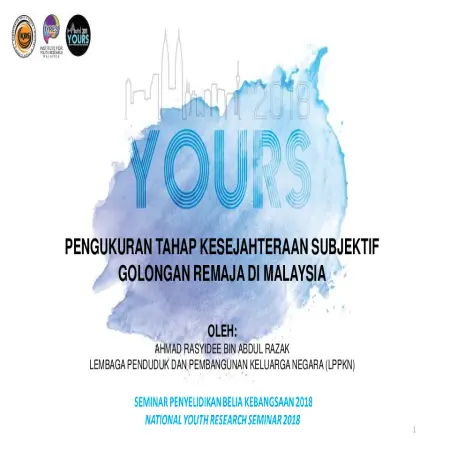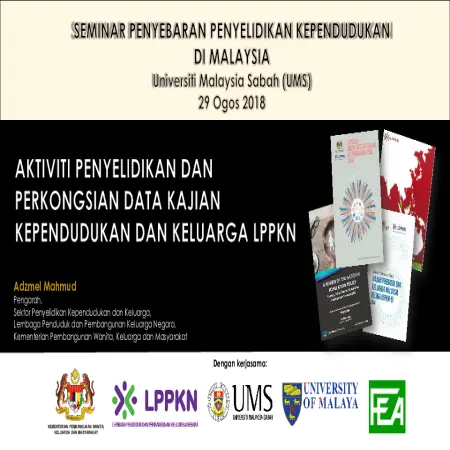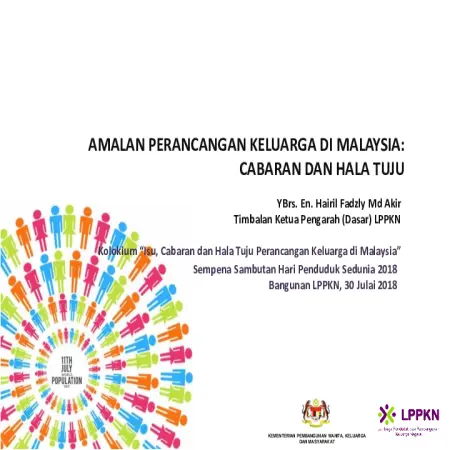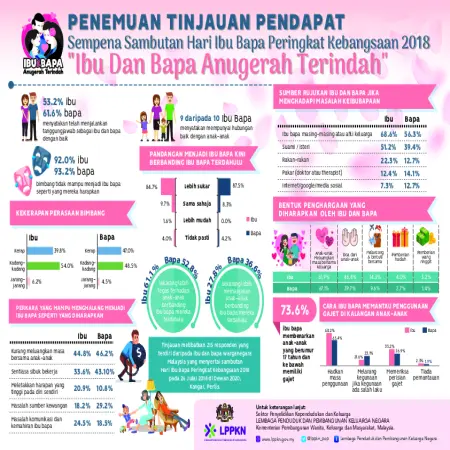TOPICS
|
|
Modul Cakna Diri Lelaki Pendidikan Kesihatan Reproduksi dan Seksual Untuk Remaja Lelaki Berumur 16-24 Tahun
Item Type: Module
Editor:
Year: 00/01/2018
Abstract: The Sexual and Reproductive Health Module for boys and young men age 16 to 24 years was developed to address sexual and reproductive health as well as social issues for boys and young men. It is also aim to create awareness on the importance of reproductive health and social education as well as gender equality for future well-being. This module is divided into two (2) main target groups i.e. general adolescents (Module A) and most-at-risk adolescents (Module B). The main components of Module A includes topics on adolescent growth, developmental, health, psychosocial - 3R (Respect, Relationship and Responsibility), laws and regulations, drugs and substance abuse. Module B covers topics on risky social behaviors, risky sexual behaviors and teen pregnancy. This module is developed as an interactive form using various learning methods such as role play, sketches, group work and discussions to attract participation of boys and young men.
|
|
|
|
|
|
The role of families and family policies in achieving inclusive societies: Malaysia experiences
Item Type: Newsletter
Editor:
Year: 00/00/2018
Abstract: With an ever increasing proportion of elder population, today’s family are being pressured to provide multi generation family support, known as “sandwich family”. Hence, Malaysia has introduced a National Family Policy with a comprehensive set of plan of action for the year 2010 until 2020, a complement to the family well-being index. Next, community based intervention program called Family and Community Empowerment Program (FACE) and Family Impact Assessment (FIA) where an evaluation on the impact of family-related policies and program will be accessed.
|
|
|
|
|
|
Sustainable cities, human mobility & international migration
Item Type: Newsletter
Editor:
Year: 00/00/2018
Abstract: Over the past decades, Malaysia has experienced and influx of migrant workers, and has become one of the main destinations. In 2016, there were an estimated 3.1 million migrants in Malaysia, which comprises of 1.3 million skilled workers and 1.8 million unskilled workers.
|
|
|
|
|
|
Pengukuran tahap kesejahteraan subjektif golongan remaja di Malaysia
Item Type: Conference or Workshop Item
Editor:
Year: 00/00/2018
Abstract: This presentation aims to measure the level of subjective well-being of adolescents in the country aged between 18 and 24 years old. A total of 2,597 respondents were analyzed using data from the Fifth Malaysian Population and Family Survey (MPFS-5). The article found that the level of subjective well-being is higher in female adolescents as compared to male adolescents, the level of well-being especially their standard of living, health and safety will be reduced in tandem with an increase in age.
|
|
|
|
|
|
Amalan perancangan keluarga di Malaysia: cabaran dan hala tuju
Item Type: Conference or Workshop Item
Editor:
Year: 00/00/2018
Abstract: Family planning allows people to attain their desired number of children and determine the spacing of pregnancies. It is achived through use of contraceptive method and the treatment of infertility. Proportion of women of reproductive aged 15-49 years who have their need for family planning satisfied with modern methods.
|
|
|
|
|
|
Peranan sosialisasi ibu atau bapa komuter dipermudahkan dengan bantuan teknologi gajet dan media sosial: kajian kes di bangunan Ibu Pejabat LPPKN
Item Type: Thesis
Editor:
Year: 00/00/2018
Abstract: This study looks into the role of parents as the socialisation agent for their children in the lives of commuter families, which refers to the parents who do not live with their children due to distance and occupational demands. The rapid development of gadgets and social media technology such as the development of smart phones and
web 2.0 has allowed online social interactions made possible and can be used as a medium of change in being able to connect people who are at a distance from each other as seen in the case of commuter children and their parents. This study looks closely at how gadgets and social media technology helps parents of commuter families who work specifically at the LPPKN headquarters building and the role it plays
as a socialisation agent for their children. There are three research objectives in this study and they are as follows i) to explore the usage of gadgets and social media technology by parents in commuter families, ii) to identify the parenting style that is practiced by parents in commuter families when interacting with their children, iii) to analyse the effects of gadgets and social media technology on the role of parents in commuter families as the socialisation agent for their children. This study uses the qualitative approach through in-depth interviews and non-participant observation there are 10 participants involved in this study that was selected using purposive sampling. The symbolic interactionism and dramaturgy theory was used to explain the role of
gadgets and social media technology to the parents of commuter families and in helping them to understand their role in the socialisation of their children. Results from the study has shown that the use of gadgets and social media technology has definitely aided parents in commuter families' role in being the socialisation agent for their
children through online interactions. Other results include gaining insight to the authoritative parenting style that is executed in a democratic nature of commuter family parents and their consciousness towards the needs of their children. Besides that, the study has shown that gadgets and social media technology has given a positive effect towards parents of commuter families' role in being the socialisation agent for their children, in that it strengthens the bond and interactions between parent and child. This study has found that the use of gadgets and social media technology has enabled parents of commuter families to exercise their socialisation responsibilities towards their children through means of educating them and instilling moral values.
|
|
|
|
|
|
Penemuan tinjauan pendapat sempena sambutan hari ibu bapa peringkat kebangsaan 2018 "Ibu dan bapa anugerah terindah"
Item Type: Infographic
Editor:
Year: 00/00/2018
Abstract: This infographic is about the findings of the opinion poll in conjunction with the 2018 national Parents' days celebration with the theme "Ibu dan bapa anugerah terindah". 9 out of 10 parents state having a good relationship with children.
|
|
|
|
|
|
Parenting style and risk level of drug abuse among students in USIM
Item Type: Thesis
Editor:
Year: 00/00/2018
Abstract: Drug issue is a worldwide problem being faced by many countries and creates a complicated social problem including drug abuse among teenagers. This requires an aggressive corrective action by related agencies because it is getting rampant and has yet to be resolved. Nevertheless, society cannot always depend upon the related agencies to solve this problem. The family institution is believed to also have a role to prevent or reduce the drug abuse rate in teenagers. Looking on this aspect, the parenting style is important in shaping good character in behavior, interest, goals, and beliefs of the teenagers. A total of 121 Tamhidi students in USIM involved as respondents for the present study. Each respondent was given a questionnaire with 60 questions, represented by three sections which are - A: Demography; B: DAST-20; and C: Parenting Style. Results revealed that gender has a significant difference (p<0.05) on sociodemographic characteristic. However, no significant difference (p>0.05) were observed on the age, parent marital status, and family household. On the other part of the study, significant difference (p<0.05) was observed on the parenting style. Authoritarian style of parenting has recorded with a low-risk (46.3%) drug taking by the respondents followed by permissive parenting style (25.0%). The analysis also revealed that respondents with parent who are applying the authoritative parenting style had no-risk of possibility on taking drug (96.7%). In summary, socio-demographic attribute on gender and permissive parenting styles has been associated with high-risk drug abuse among respondents in the present study.
|
|
|
|





